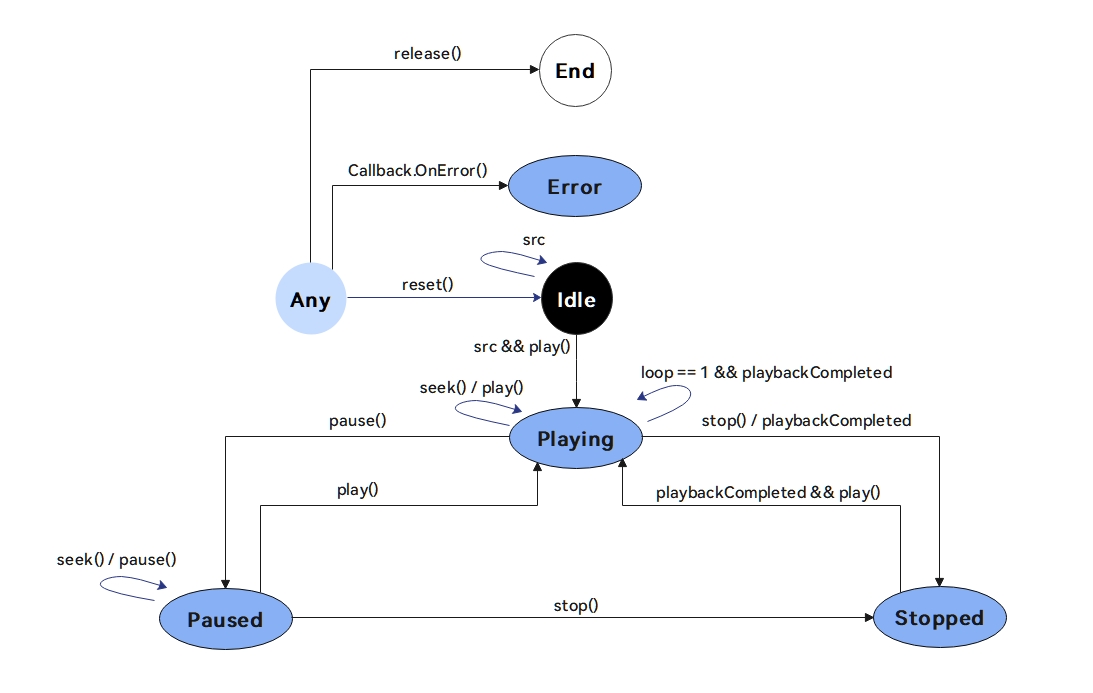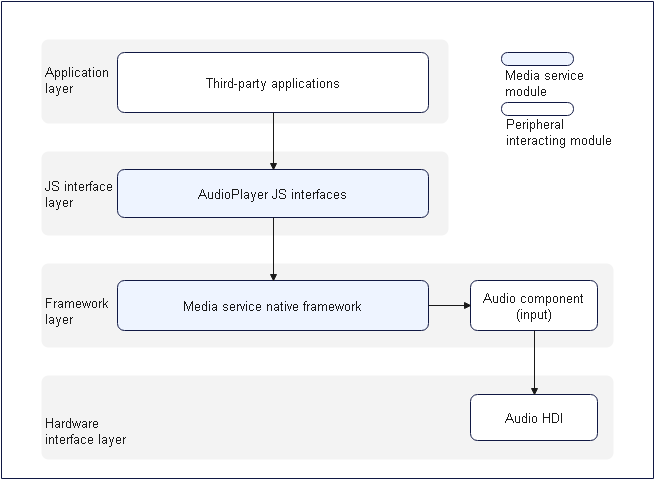harmony 鸿蒙Audio Playback Development
Audio Playback Development
Introduction
You can use audio playback APIs to convert audio data into audible analog signals and play the signals using output devices. You can also manage playback tasks. For example, you can control the playback and volume, obtain track information, and release resources.
Working Principles
The following figures show the audio playback state transition and the interaction with external modules for audio playback.
Figure 1 Audio playback state transition

NOTE: If the status is Idle, setting the src attribute does not change the status. In addition, after the src attribute is set successfully, you must call reset() before setting it to another value.
Figure 2 Interaction with external modules for audio playback

NOTE: When a third-party application calls the JS interface provided by the JS interface layer to implement a feature, the framework layer invokes the audio component through the media service of the native framework and outputs the audio data decoded by the software to the audio HDI of the hardware interface layer to implement audio playback.
How to Develop
For details about the APIs, see AudioPlayer in the Media API.
NOTE
The method for obtaining the path in the FA model is different from that in the stage model. For details about how to obtain the path, see Application Sandbox Path Guidelines.
Full-Process Scenario
The full audio playback process includes creating an instance, setting the URI, playing audio, seeking to the playback position, setting the volume, pausing playback, obtaining track information, stopping playback, resetting the player, and releasing resources.
For details about the src types supported by AudioPlayer, see the src attribute.
import media from '@ohos.multimedia.media'
import fileIO from '@ohos.fileio'
// Print the stream track information.
function printfDescription(obj) {
for (let item in obj) {
let property = obj[item];
console.info('audio key is ' + item);
console.info('audio value is ' + property);
}
}
// Set the player callbacks.
function setCallBack(audioPlayer) {
audioPlayer.on('dataLoad', () => { // Set the 'dataLoad' event callback, which is triggered when the src attribute is set successfully.
console.info('audio set source success');
audioPlayer.play(); // The play() API can be invoked only after the 'dataLoad' event callback is complete. The 'play' event callback is then triggered.
});
audioPlayer.on('play', () => { // Set the 'play' event callback.
console.info('audio play success');
audioPlayer.pause(); // Trigger the 'pause' event callback and pause the playback.
});
audioPlayer.on('pause', () => { // Set the 'pause' event callback.
console.info('audio pause success');
audioPlayer.seek(5000); // Trigger the 'timeUpdate' event callback, and seek to 5000 ms for playback.
});
audioPlayer.on('stop', () => { // Set the 'stop' event callback.
console.info('audio stop success');
audioPlayer.reset(); // Trigger the 'reset' event callback, and reconfigure the src attribute to switch to the next song.
});
audioPlayer.on('reset', () => { // Set the 'reset' event callback.
console.info('audio reset success');
audioPlayer.release(); // Release the AudioPlayer instance.
audioPlayer = undefined;
});
audioPlayer.on('timeUpdate', (seekDoneTime) => { // Set the 'timeUpdate' event callback.
if (typeof(seekDoneTime) == 'undefined') {
console.info('audio seek fail');
return;
}
console.info('audio seek success, and seek time is ' + seekDoneTime);
audioPlayer.setVolume(0.5); // Trigger the 'volumeChange' event callback.
});
audioPlayer.on('volumeChange', () => { // Set the 'volumeChange' event callback.
console.info('audio volumeChange success');
audioPlayer.getTrackDescription((error, arrlist) => { // Obtain the audio track information in callback mode.
if (typeof (arrlist) != 'undefined') {
for (let i = 0; i < arrlist.length; i++) {
printfDescription(arrlist[i]);
}
} else {
console.log(`audio getTrackDescription fail, error:${error.message}`);
}
audioPlayer.stop(); // Trigger the 'stop' event callback to stop the playback.
});
});
audioPlayer.on('finish', () => { // Set the 'finish' event callback, which is triggered when the playback is complete.
console.info('audio play finish');
});
audioPlayer.on('error', (error) => { // Set the 'error' event callback.
console.info(`audio error called, errName is ${error.name}`);
console.info(`audio error called, errCode is ${error.code}`);
console.info(`audio error called, errMessage is ${error.message}`);
});
}
async function audioPlayerDemo() {
// 1. Create an AudioPlayer instance.
let audioPlayer = media.createAudioPlayer();
setCallBack(audioPlayer); // Set the event callbacks.
// 2. Set the URI of the audio file.
let fdPath = 'fd://'
let pathDir = "/data/storage/el2/base/haps/entry/files" // The path used here is an example. Obtain the path based on project requirements.
// The stream in the path can be pushed to the device by running the "hdc file send D:\xxx\01.mp3 /data/app/el2/100/base/ohos.acts.multimedia.audio.audioplayer/haps/entry/files" command.
let path = pathDir + '/01.mp3'
await fileIO.open(path).then((fdNumber) => {
fdPath = fdPath + '' + fdNumber;
console.info('open fd success fd is' + fdPath);
}, (err) => {
console.info('open fd failed err is' + err);
}).catch((err) => {
console.info('open fd failed err is' + err);
});
audioPlayer.src = fdPath; // Set the src attribute and trigger the 'dataLoad' event callback.
}
Normal Playback Scenario
import media from '@ohos.multimedia.media'
import fileIO from '@ohos.fileio'
export class AudioDemo {
// Set the player callbacks.
setCallBack(audioPlayer) {
audioPlayer.on('dataLoad', () => { // Set the 'dataLoad' event callback, which is triggered when the src attribute is set successfully.
console.info('audio set source success');
audioPlayer.play(); // Call the play() API to start the playback and trigger the 'play' event callback.
});
audioPlayer.on('play', () => { // Set the 'play' event callback.
console.info('audio play success');
});
audioPlayer.on('finish', () => { // Set the 'finish' event callback, which is triggered when the playback is complete.
console.info('audio play finish');
audioPlayer.release(); // Release the AudioPlayer instance.
audioPlayer = undefined;
});
}
async audioPlayerDemo() {
let audioPlayer = media.createAudioPlayer(); // Create an AudioPlayer instance.
this.setCallBack(audioPlayer); // Set the event callbacks.
let fdPath = 'fd://'
let pathDir = "/data/storage/el2/base/haps/entry/files" // The path used here is an example. Obtain the path based on project requirements.
// The stream in the path can be pushed to the device by running the "hdc file send D:\xxx\01.mp3 /data/app/el2/100/base/ohos.acts.multimedia.audio.audioplayer/haps/entry/files" command.
let path = pathDir + '/01.mp3'
await fileIO.open(path).then((fdNumber) => {
fdPath = fdPath + '' + fdNumber;
console.info('open fd success fd is' + fdPath);
}, (err) => {
console.info('open fd failed err is' + err);
}).catch((err) => {
console.info('open fd failed err is' + err);
});
audioPlayer.src = fdPath; // Set the src attribute and trigger the 'dataLoad' event callback.
}
}
Switching to the Next Song
import media from '@ohos.multimedia.media'
import fileIO from '@ohos.fileio'
export class AudioDemo {
// Set the player callbacks.
private isNextMusic = false;
setCallBack(audioPlayer) {
audioPlayer.on('dataLoad', () => { // Set the 'dataLoad' event callback, which is triggered when the src attribute is set successfully.
console.info('audio set source success');
audioPlayer.play(); // Call the play() API to start the playback and trigger the 'play' event callback.
});
audioPlayer.on('play', () => { // Set the 'play' event callback.
console.info('audio play success');
audioPlayer.reset(); // Call the reset() API and trigger the 'reset' event callback.
});
audioPlayer.on('reset', () => { // Set the 'reset' event callback.
console.info('audio play success');
if (!this.isNextMusic) { // When isNextMusic is false, changing songs is implemented.
this.nextMusic(audioPlayer); // Changing songs is implemented.
} else {
audioPlayer.release(); // Release the AudioPlayer instance.
audioPlayer = undefined;
}
});
}
async nextMusic(audioPlayer) {
this.isNextMusic = true;
let nextFdPath = 'fd://'
let pathDir = "/data/storage/el2/base/haps/entry/files" // The path used here is an example. Obtain the path based on project requirements.
// The stream in the path can be pushed to the device by running the "hdc file send D:\xxx\02.mp3 /data/app/el2/100/base/ohos.acts.multimedia.audio.audioplayer/haps/entry/files" command.
let nextpath = pathDir + '/02.mp3'
await fileIO.open(nextpath).then((fdNumber) => {
nextFdPath = nextFdPath + '' + fdNumber;
console.info('open fd success fd is' + nextFdPath);
}, (err) => {
console.info('open fd failed err is' + err);
}).catch((err) => {
console.info('open fd failed err is' + err);
});
audioPlayer.src = nextFdPath; // Set the src attribute and trigger the 'dataLoad' event callback.
}
async audioPlayerDemo() {
let audioPlayer = media.createAudioPlayer(); // Create an AudioPlayer instance.
this.setCallBack(audioPlayer); // Set the event callbacks.
let fdPath = 'fd://'
let pathDir = "/data/storage/el2/base/haps/entry/files" // The path used here is an example. Obtain the path based on project requirements.
// The stream in the path can be pushed to the device by running the "hdc file send D:\xxx\01.mp3 /data/app/el2/100/base/ohos.acts.multimedia.audio.audioplayer/haps/entry/files" command.
let path = pathDir + '/01.mp3'
await fileIO.open(path).then((fdNumber) => {
fdPath = fdPath + '' + fdNumber;
console.info('open fd success fd is' + fdPath);
}, (err) => {
console.info('open fd failed err is' + err);
}).catch((err) => {
console.info('open fd failed err is' + err);
});
audioPlayer.src = fdPath; // Set the src attribute and trigger the 'dataLoad' event callback.
}
}
Looping a Song
import media from '@ohos.multimedia.media'
import fileIO from '@ohos.fileio'
export class AudioDemo {
// Set the player callbacks.
setCallBack(audioPlayer) {
audioPlayer.on('dataLoad', () => { // Set the 'dataLoad' event callback, which is triggered when the src attribute is set successfully.
console.info('audio set source success');
audioPlayer.loop = true; // Set the loop playback attribute.
audioPlayer.play(); // Call the play() API to start the playback and trigger the 'play' event callback.
});
audioPlayer.on('play', () => { // Set the 'play' event callback to start loop playback.
console.info('audio play success');
});
}
async audioPlayerDemo() {
let audioPlayer = media.createAudioPlayer(); // Create an AudioPlayer instance.
this.setCallBack(audioPlayer); // Set the event callbacks.
let fdPath = 'fd://'
let pathDir = "/data/storage/el2/base/haps/entry/files" // The path used here is an example. Obtain the path based on project requirements.
// The stream in the path can be pushed to the device by running the "hdc file send D:\xxx\01.mp3 /data/app/el2/100/base/ohos.acts.multimedia.audio.audioplayer/haps/entry/files" command.
let path = pathDir + '/01.mp3'
await fileIO.open(path).then((fdNumber) => {
fdPath = fdPath + '' + fdNumber;
console.info('open fd success fd is' + fdPath);
}, (err) => {
console.info('open fd failed err is' + err);
}).catch((err) => {
console.info('open fd failed err is' + err);
});
audioPlayer.src = fdPath; // Set the src attribute and trigger the 'dataLoad' event callback.
}
}
你可能感兴趣的鸿蒙文章
harmony 鸿蒙Audio Capture Development
harmony 鸿蒙Audio Interruption Mode Development
harmony 鸿蒙Audio Recording Development
harmony 鸿蒙Audio Rendering Development
harmony 鸿蒙Audio Routing and Device Management Development
harmony 鸿蒙Audio Stream Management Development
- 所属分类: 后端技术
- 本文标签: